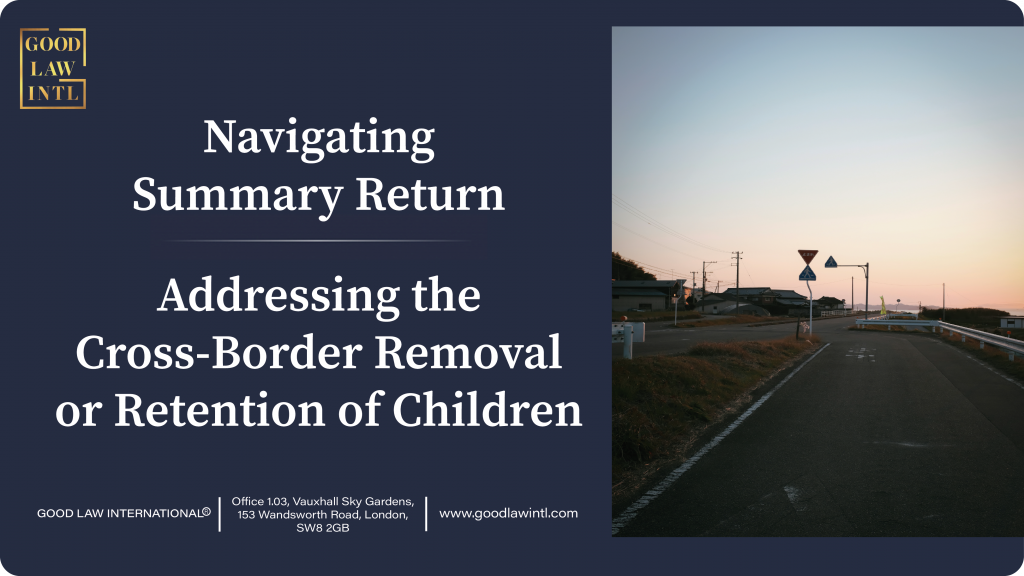
Navigating Summary Return:
Addressing the Cross-Border Removal or Retention of Children

Lara Shehadeh
Family Paralegal
What is Summary Return?
In the UK, summary return is a legal process where a court orders a child to be returned immediately to their home country after being wrongfully taken or kept abroad. It applies in international child abduction when one parent takes or keeps a child abroad without the other’s consent. Summary return quickly restores the status quo, letting the child’s habitual country handle custody instead of the country where they were taken.
In the UK, the summary return process reflects the principle that time is of the essence. Delays in resolving these cases can exacerbate the emotional turmoil for both the child and the parents involved. Thus, the court moves quickly to decide whether the child must return to their home country, allowing that country to address any substantive custody disputes.
Differences Between Hague and Non-Hague Countries
The law treats summary return very differently depending on whether a parent abducts a child to a Hague Convention country or a non-Hague Convention country.
Hague Convention Countries: The Hague Convention on the Civil Aspects of International Child Abduction, 1980, is a multilateral treaty that provides a standardized process for the return of abducted children. When both the UK and the country receiving the child sign the Hague Convention, the authorities handle the process smoothly. The primary focus is on the prompt return of the child unless exceptions apply, such as the risk of grave harm or if the child is mature enough to object to the return. The Hague framework emphasizes speed and cooperation between countries, reducing the potential for prolonged legal battles.
Non-Hague Convention Countries: When dealing with non-Hague countries, the legal process is more complex and less predictable. The UK courts must rely on their inherent jurisdiction or the wardship jurisdiction to decide whether to order the child’s return. There is no automatic presumption of return, and the court must conduct a more detailed welfare analysis. Each case is treated on its own facts, and the legal principles from leading cases like Re J (A Child) (Custody Rights: Jurisdiction) [2006] 1 AC 80 guide the court’s decision-making process.
This can make proceedings longer and more contentious, as the court must carefully weigh the child’s best interests without the benefit of a treaty framework.
What Factors Does the Judge Consider?
In both Hague and non-Hague cases, the court’s primary consideration is the welfare of the child. However, the factors the judge considers can differ based on the nature of the case.
- Hague Convention Cases: The court primarily focuses on whether the child was wrongfully removed or retained, and whether any exceptions apply to prevent the child’s return. For instance, if there is a grave risk that returning the child would expose them to harm, the court may refuse to order a return. Similarly, if the child is of sufficient age and maturity to have a say in the matter, their views may be taken into account.
- Non-Hague Convention Cases: The court must engage in a more detailed welfare analysis, as there is no presumption in favor of return. The judge will consider several factors, including:
- The child’s connection to each country: This involves an examination of where the child has lived, their nationality, language, cultural ties, and education.
- The time spent in each country: The court considers whether returning the child to their home country would disrupt them or whether they have already formed a significant connection to the country where they currently live.
- Legal protections in the foreign jurisdiction: The court will consider whether the legal system in the other country can adequately protect the child’s welfare. If the other country lacks appropriate legal frameworks, the UK court may be reluctant to order a return.
- Impact on the primary carer: The judge will evaluate the potential impact of the decision on the child’s primary caregiver, recognizing that their well-being is often closely intertwined with the child’s welfare(International child abd…).
In non-Hague cases, the court faces more unpredictability because it must tailor its decision to the unique facts of the case instead of relying on the Hague Convention’s standard procedures.
Conclusion
Navigating the complexities of international child abduction cases requires a clear understanding of both the legal frameworks and the practical realities of summary return in the UK. Whether dealing with a Hague or non-Hague Convention country, the focus remains on the child’s best interests, but the path to resolution can vary significantly.
As a London-based lawyer, I advise parents in these situations to seek legal guidance early, understand the case’s nuances, and prepare for the challenges that arise, especially in non-Hague Convention scenarios. By approaching these cases with both legal expertise and sensitivity to the emotional stakes, we can work towards ensuring the best possible outcome for the child involved.
For specialist advice and support. Please get in touch with our corporate solicitors in London by contacting the GOOD LAW INTL office.
A warm welcome to GOOD LAW INTL. To learn more about us and our practice areas, we invite you to browse through our website and contact us or book an appointment.



